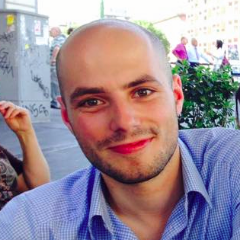In Rossini's opera buffa La pietra del paragone, a wealthy Count tricks guests at a party into believing that he is bankrupt, to test the true intentions of the various women that vie for his heart. Discovering that they have been duped, they plot their revenge. After the earnest war-mongering of Le siège de Corinthe, which opened this year's Rossini Opera Festival, here was a story of frivolous good fun.
Pier Luigi Pizzi's 2002 production relocates the action to the 1970s, where young posers are lounging in bikinis and tight trunks on front lawn of a minimalist house – all glass panels and colourful art on pristine white walls (and apparently based on the director's personal abode!). The lively characters we get in the production, you feel, must also be products of the 87-year-old director's personal experience. They change costumes every five minutes or so, and their bright dresses, crisp summer suits and dazzling printed shirts become increasingly garish as the evening wears on: an ingenious means of investing this production with its own rhythmic logic. A backdrop lit in shifting pastel colours, on the other hand, is suggestive of the slow passage of time.
Pizzi's playful conception is a thing of unbridled creativity. Macrobio and Giocondo play imaginary tennis from platforms eithers end of the pit, Pacuvio dives into a pool at the end of an aria, the Count works out on an excercise machine while he sings and characters deliver recitative via a telefone whose ringing is sounded out by a xylophone in the pit. Everywhere you look, Pizzi has matched Luigi Romanelli's wonderful libretto with a wealth of detail. “Bravo, no, bravissimo!”, shout the hunters to Pacuvio, when first he points his gun the wrong way before being corrected.
Baritone Alex Esposito's withdrawal from the festival this year due to illness led to a pan-production switch up, with the result that Gianluca Margheri has stepped in to sing the Count. The baritone has the torso of a body-builder (he is required to sing with his shirt off a lot of the time) but his acting was a little stiff, and you feel the baritone wasn't chosen for his voice, which sounded not entirely up to the role's demands. Aya Wakizono had rather more allure as the Marchesa, and while the soprano's voice sometimes lacked focus in the middle of the register, hers a performance full of personality, and one in which the soprano impressed with a thrillingly powerful upper range.
The young tenor Maxim Mironov, who played the poet Giocondo, was the name on everyone's lips by the end of the show. His voice is modestly-sized and soft-grained, but it is beautifully produced, and focuses to a laser-like point up top. Mironov has a lovely sense of line, and also has necessary bite in the sound for the coloratura, which he gently massaged at times and rattled out like machine-gun fire at others. Baritone Davide Luciano's Macrobio was an equal delight. He lit up the stage with a bright-eyed theatrical display, and his fine instrument was characterful for its horn-like warmth and bright veneer.
But the finest performance of all came from the young baritone Paolo Bordogna as Pacuvio. He rides low in the saddle of this glorious, bronzen voice, and his boundlessly playful delivery left a smile constantly plastered on your face. Conductor Daniele Rustioni was a tireless bundle of energy and drew characterful playing from the Orchestra Sinfonica Nazionale della Rai, the festival's new principal orchestra. When performed as strongly as this, Pizzi's classic production feels timeless.




